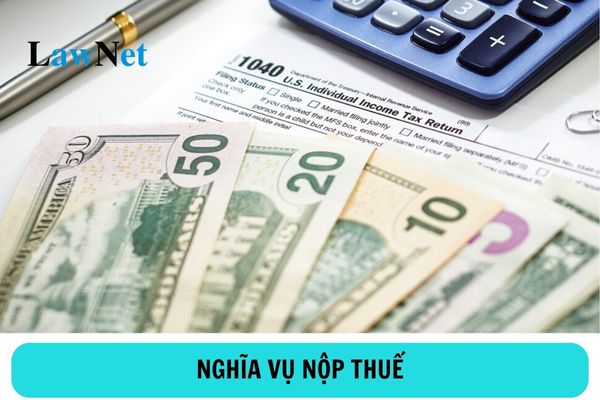What is the tax liability fulfillment in Vietnam?
What is the tax liability fulfillment in Vietnam?
According to Clause 12, Article 3 of the Law on Tax Administration 2019, the tax liability fulfillment means paying the full amount of tax due, late payment charges, fines for tax-related legal violations, and other collections belonging to the state budget.

What is the tax liability fulfillment in Vietnam? (Image from the Internet)
What are regulations on the tax liability fulfillment upon taxpayer’s exit from Vietnam?
According to Article 66 of the Law on Tax Administration 2019, the tax liability fulfillment upon taxpayer’s exit from Vietnam is regulated as follows:
- Taxpayers who are subject to enforcement of administrative decisions on tax management, Vietnamese citizens emigrating to settle abroad, overseas Vietnamese, and foreigners before leaving Vietnam must fulfill their tax liability. If they have not fulfilled their tax liability, their exit will be temporarily suspended according to the provisions of the law on exit and entry.
- The tax administration agency is responsible for notifying the exit and entry management agency about individuals and taxpayers specified in Clause 1, Article 66 of the Law on Tax Administration 2019.
What are regulations on the tax liability fulfillment upon dissolution, bankruptcy and shutdown in Vietnam?
According to Article 67 of the Law on Tax Administration 2019, the tax liability fulfillment upon dissolution, bankruptcy and shutdown is regulated as follows:
- The tax liability fulfillment in case of enterprise dissolution shall be carried out in accordance with the laws on enterprises, credit institutions, insurance business, and other relevant legal provisions.
- The tax liability fulfillment in case of enterprise bankruptcy shall be carried out following the procedures provided in the Bankruptcy Law 2014.
- Enterprises terminating operations or abandoning their registered business address without fulfilling their tax liability shall have their remaining tax debts paid by the owner of a private enterprise, single-member limited liability company owner, contributing shareholders, capital-contributing members, or general partners as prescribed for each type of enterprise in the Enterprise Law 2020.
- Household businesses and business individuals terminating business operations without fulfilling their tax liability shall have their remaining tax debts paid by the household head or individual.
- A taxpayer with branches or dependent units terminating operations with outstanding tax debts and other state budget collections shall be responsible for inheriting the debts of the branches or dependent units.
What are regulations on the tax liability fulfillment upon enterprise rearrangement in Vietnam
According to Article 68 of the Law on Tax Administration 2019, the tax liability fulfillment upon enterprise rearrangement is regulated as follows:
- Enterprises subject to division must fulfill their tax liability before the division. If the tax liability are not yet completed, the newly established enterprises from the divided enterprise shall be responsible for fulfilling the tax liability.
- Enterprises subject to separation, merger, or consolidation must fulfill their tax liability before the separation, merger, or consolidation. If the tax liability are not yet completed, the separated enterprise, the new enterprise formed from the separation, the merged enterprise, and the acquiring enterprise shall be responsible for fulfilling the tax liability.
- Enterprises changing their type of business must fulfill their tax liability before the change. If the tax liability are not yet completed, the converted enterprise must fulfill the tax liability.
- The reorganization of enterprises does not alter the tax payment deadline of the reorganized enterprise. If the reorganized enterprise or newly established enterprises fail to pay taxes fully by the set deadline, penalties will be imposed as per the law.
What are regulations on the tax liability fulfillment upon a taxpayer’s death or court declaration that a taxpayer is dead, missing or incapacitated in Vietnam
According to Article 69 of the Law on Tax Administration 2019, the tax liability fulfillment upon a taxpayer’s death or court declaration that a taxpayer is dead, missing or incapacitated is regulated as follows:
- The tax liability fulfillment for a deceased person or a person declared dead by the court shall be performed by the heirs from the deceased person's estate or from the inheritance share at the time of receiving the inheritance.
If there are no heirs or all heirs refuse to accept the inheritance, the fulfillment of the tax liability shall follow the provisions of civil law.
- The tax liability fulfillment for a person declared missing or incapacitated by the court shall be performed by the property manager of the missing or incapacitated person from their assets.
- If the court revokes the declaration of a person as deceased, missing, or incapacitated, the tax debts, late payment charges, and fines that were written off under Article 85 of the Law on Tax Administration 2019 will be reinstated, but no late payment charges will be imposed for the period during which the person was declared deceased, missing, or incapacitated.

